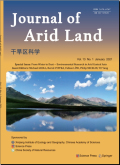干旱区科学2024,Vol.16Issue(3):447-459,13.DOI:10.1007/s40333-024-0008-0
Responses of plant diversity and soil microorganism diversity to nitrogen addition in the desert steppe,China
Responses of plant diversity and soil microorganism diversity to nitrogen addition in the desert steppe,China
摘要
关键词
soil microorganisms/plant-microbial community interaction/plant diversity/nitrogen deposition/desert steppeKey words
soil microorganisms/plant-microbial community interaction/plant diversity/nitrogen deposition/desert steppe引用本文复制引用
YE He,HONG Mei,XU Xuehui,LIANG Zhiwei,JIANG Na,TU Nare,WU Zhendan..Responses of plant diversity and soil microorganism diversity to nitrogen addition in the desert steppe,China[J].干旱区科学,2024,16(3):447-459,13.基金项目
This work was funded by the National Natural Science Foundation of China(31860136,31560156),the Basic Scientific Research Service Fee Project of Colleges and Universities of Inner Mongolia Autonomous Region,and the Graduate Scientific Research Innovation Project of Inner Mongolia Autonomous Region(B20210158Z).We thank the Siziwang Research Station of Inner Mongolia Academy of Agricultural&Animal Husbandry Sciences for their supports. (31860136,31560156)

